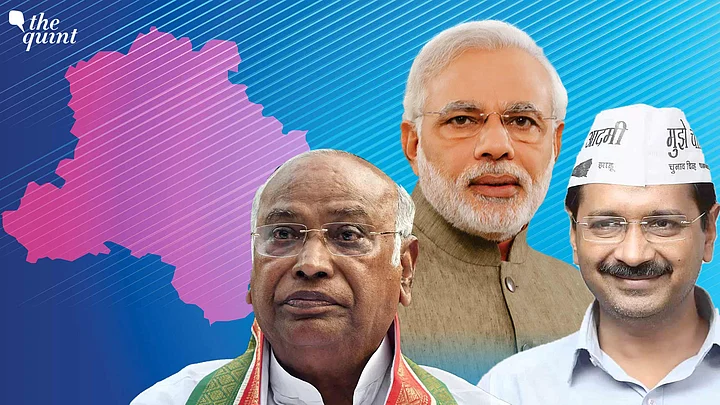Judging by the jingles playing on the streets of Delhi for the last few weeks, this election to the Municipal Corporation of Delhi seems as keenly fought as the Assembly or Lok Sabha elections, if not more. Voting takes place on 4 December and the results will be announced on 7 December.
There are several reasons why this election may mean a lot more than just control over Delhi's Municipal Corporation.
1. Narendra Modi vs Arvind Kejriwal Personality Contest
Delhi is known to vote more for personalities than parties. For instance, the city voted for Atal Bihari Vajpayee's Bharatiya Janata Party in both the 1998 and 1999 Lok Sabha elections but overwhelmingly backed Sheila Dikshit's Congress in the Assembly election that took place in between.
Delhi gave all seven Lok Sabha seats to the BJP in Narendra Modi's name in 2014 and 2019, only to hand Arvind Kejriwal a landslide at the Assembly level less than a year later.
Not surprisingly in this MCD election, the BJP is seeking votes in Modi's name while the Aam Aadmi Party's slogan is 'MCD Mein Bhi Kejriwal'.
So who will this round go to? Can Prime Minister Modi's personal popularity help BJP undercut 15 years of anti-incumbency? Or will Kejriwal help AAP trump BJP's organisational dominance?
2. MCD Results Will Be Viewed In Tandem With Gujarat and Himachal Pradesh
It so happens that the MCD elections were announced while the Assembly election campaigns in Gujarat and Himachal Pradesh were still underway.
Incidentally, all three elections involve a triangular contest between the BJP, Congress, and AAP.
The BJP is the incumbent in all three contests.
Being a smaller party and heavily dependent on Kejriwal's personality, the AAP found it difficult to balance between the three elections. In the end, it seems to have compromised Himachal Pradesh and focused more on Gujarat and the MCD.
Though the MCD results are a day before the state election results, they will all be viewed in tandem to judge the present political strength of the three parties – BJP, Congress, and AAP.
Will BJP retain all three? Or can either the AAP or Congress, or both, inflict a defeat on the BJP in one of the elections or the other?
3. First Major Election in Delhi After a Number of Key Events
This is the first pan-Delhi election after three major events – the 2020 northeast Delhi riots, the 2020 and 2021 COVID-19 waves, and the pollution crisis.
The 2020 riots did polarise the atmosphere in northeast Delhi to a great extent. The roots of that polarisation were visible even during the Delhi Assembly elections that were completed less than a month before the riots.
After the riots, the AAP faced flak from both Hindus and Muslims in northeast Delhi, for not taking a stand.
In this election, AIMIM chief Asaduddin Owaisi attacked the AAP on this issue.
Is that sentiment still there? Or have local issues taken over?
The COVID-19 waves on the other hand put both the BJP-led central government and AAP's state government under test. It is not clear how much that would be a factor.
Pollution, no doubt, is a major factor for voters in Delhi. And with the worst crisis having taken place barely a month ago, it would still be fresh in the minds of voters.
4. AAP Cannot Afford to Lose
The MCD election is a do or die battle for AAP. If it loses MCD and remains third in Gujarat, its national ambitions may suffer a setback.
It would send the signal that in his efforts to expand nationally, Kejriwal is losing control of Delhi. As it is in Punjab, the AAP government has gone from one crisis to another ever since it came to power.
Another problem will arise for AAP if it loses MCD to the BJP and this is due to the unification of the North, East, and South Municipal Corporations back into a single MCD.
The unification would mean that a BJP mayor would have control over the entire city's civic body and will have the powers close to that of a CM, given that the Delhi government doesn't enjoy the same powers as a state government.
This could potentially be used to undermine Kejriwal and keep him entangled in Delhi affairs in future.
Therefore, getting control of MCD is absolutely essential for AAP.
5. Watch Out for BJP's Vote Share
It is interesting that BJP's vote share in Delhi hasn't fallen below 32 percent in any election since 1990s. Even in its 2015 debacle, the party retained a respectable vote share of 32.3 percent. It swept the MCD polls in 2012 and 2017 with 37 percent votes, which was still one percentage point lower than what it got in the 2020 Assembly elections.
This basically means that the BJP has a stable base of about 32 percent in Delhi which it retains irrespective of whether it is a national, state or civic election.
It is the remaining 68 percent that keeps shifting. It got divided between Congress, AAP, and others in the 2017 MCD elections and consolidated behind AAP in the 2015 and 2020 Assembly polls. And at the Lok Sabha level, about half of this floating vote came to the BJP itself in the last two elections.
If BJP's vote share falls below 32 percent, it could be sign of a larger decline. On the other hand if it increases from the 37 percent it got in 2012 and 2017, it would be a clear indication that the party is going strong.
(At The Quint, we question everything. Play an active role in shaping our journalism by becoming a member today.)
